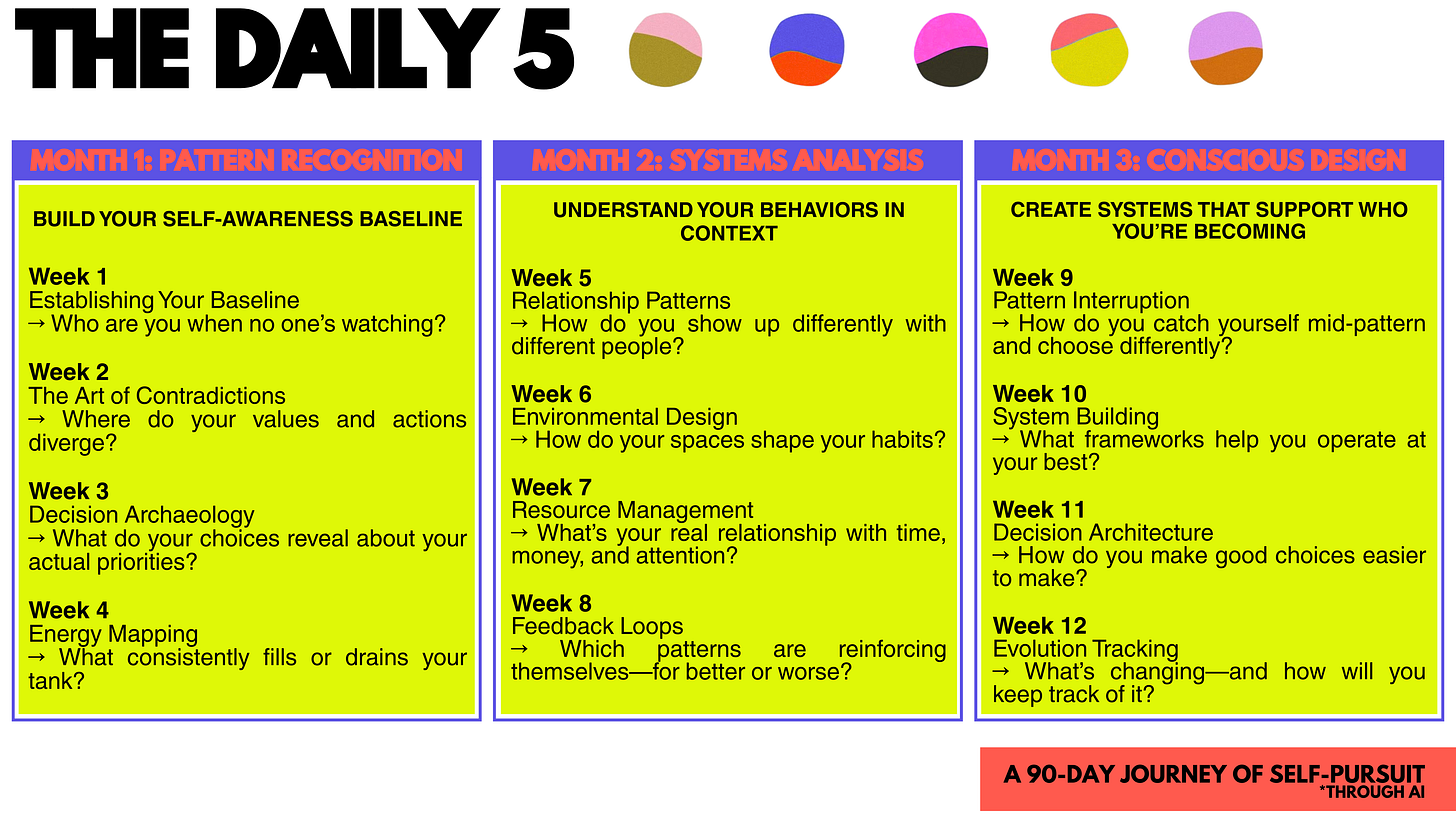Welcome to THE DAILY 5—a 90-day journey in self-inquiry, pattern recognition, and collaborative intelligence. Whether you’re just starting or deep in the process, here’s everything you might want to know.
What is THE DAILY 5?
THE DAILY 5 is a guided, 12-week journaling and AI-reflection framework built to help you understand yourself more deeply—without disappearing into self-help overwhelm.
Each week includes 7 days of prompts, paired with AI reflection questions designed to help you notice patterns you’re too close to see on your own.
Why is it called “THE DAILY 5”?
The name comes from how it started: five minutes a day of stream-of-consciousness journaling, no pressure, no goals—just a small daily habit of tuning into myself.
Even though the format has evolved, the philosophy hasn’t: small inputs scale. Five minutes a day adds up to over 30 hours a year of deliberate self-observation—and those hours can reshape how you live.
You can read more about the origins of this practice here.
Do I have to use AI to do this?
Nope. The prompts are designed to work with or without AI.
But if you do use an AI assistant (like ChatGPT or Claude), it can help you uncover patterns, ask better questions, and track subtle shifts in your thinking over time.
You don’t need to be tech-savvy—each post includes suggested language to give your AI helpful context and even follow-up questions you can ask it.
Need help setting up your AI? Visit the Getting Started Guide
How is each week structured?
Each week is built around a central theme and includes:
A high-level overview of the week’s purpose
7 daily prompts
Context you can give to your AI to deepen the conversation
Optional Canva worksheets (example shown below)
Optional follow-up questions to explore with your AI (starts Week 3)
All 7 days are included in one weekly post so it’s easy to bookmark, revisit, and track conversations.
What’s covered over the course of 90-days?
What will I get out of this?
If you actually show up—even imperfectly—you’ll build:
A self-generated archive of your thoughts, patterns, and contradictions
A real-time database of your behavioral patterns
A map of how your energy, values, and choices interact
A personal relationship with your AI that gets smarter the more you share
Systems that reflect how you actually work, not how you wish you did
Real-time self-awareness that allows you to interrupt patterns, not just notice them
This isn’t therapy—it’s the work of self-evolution. It’s training in being awake to your life.
How much time does it take?
You can do this in as little as five minutes a day. Or you can go deeper. Up to you.
This is a framework, not a homework assignment. Show up imperfectly. Miss days. Pick it back up. Your nervous system will thank you.
What if I’m just joining? Should I start at Week 1?
Yes. Start at Week 1 to build your baseline.
Each week builds on the last, and the early prompts teach your AI about you—your rhythms, contradictions, blind spots, values, and voice. The deeper you go, the more the system works for you.
👉 Click here to start at Week 1
Can I do this offline?
Absolutely. You can journal privately or download the worksheets provided each week. The AI reflection is optional—this is about building a sustainable self-awareness practice, not depending on a machine to validate you.
I have feedback or questions. Where do I send them?
This is a living framework. I’m building it in real-time based on what’s working (and what’s not). I’d love to hear from you.
Feel free to email me or leave a comment on any post. I read everything.
Anything else I should know?
Just this:
You don’t have to “fix” yourself. You just have to know yourself.
That’s what we’re trying to do here.
Some helpful links:
TD5: Week One — The Foundation
TD5: Week Two — Contradictions
TD5: Week Three — Decision Archaeology
The beauty of THE DAILY 5 practice is that it scales to meet you wherever you are. Some days, five minutes of basic documentation is exactly what you need. Other days, you'll find yourself three hours deep in a conversation about why you always apologize before expressing an opinion, or how your relationship with time mirrors your mother's relationship with scarcity, or what it means that you feel most creative when you're slightly depressed. This isn’t self-help—it’s systems mapping.
Ready to give it a try?






